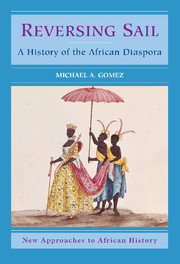8 - Movement People
Summary
Movement has long been a principal characteristic of the African Diaspora. The period from 1945 to 1968 was an important era of “movement,” a term that, in contrast to involuntary transatlantic transfers and reluctant labor migrations, came to signify organized campaigns to reverse the legacies of slavery and discrimination. Black people were indeed on the move, fighting racism and colonialism globally. In concert with each other and the aspirations of the similarly downtrodden, the period witnessed the persistence of a defiance made manifest with the first slave revolt, the continuing quest for the full free.
The period after the Second World War created new conditions for freedom's struggle. Nazi Germany's defeat discredited racism and brought the concept of empire under increasingly unfavorable light. Returning African veterans further fueled anticolonial protests, adding to the costs of maintaining colonies. Europe, seat of colonial power in Africa, was superceded by the United States and the Soviet Union as the two world superpowers, neither with territorial claims in Africa. The new Cold War facilitated the anti-imperial struggle while transforming parts of Africa into an East–West theater of conflict. Egypt's Gamel ʿAbd al-Nāṣir took power in 1952 and ended British military control of the Suez Canal in 1956, the year of Sudan's independence. In fact, the 1950s saw a number of African colonies held by the British, French, and Belgians achieve a generally peaceful transition to independence, in contrast to the more turbulent transition in Kenya from 1952 to 1963.
- Type
- Chapter
- Information
- Reversing SailA History of the African Diaspora, pp. 193 - 218Publisher: Cambridge University PressPrint publication year: 2004

